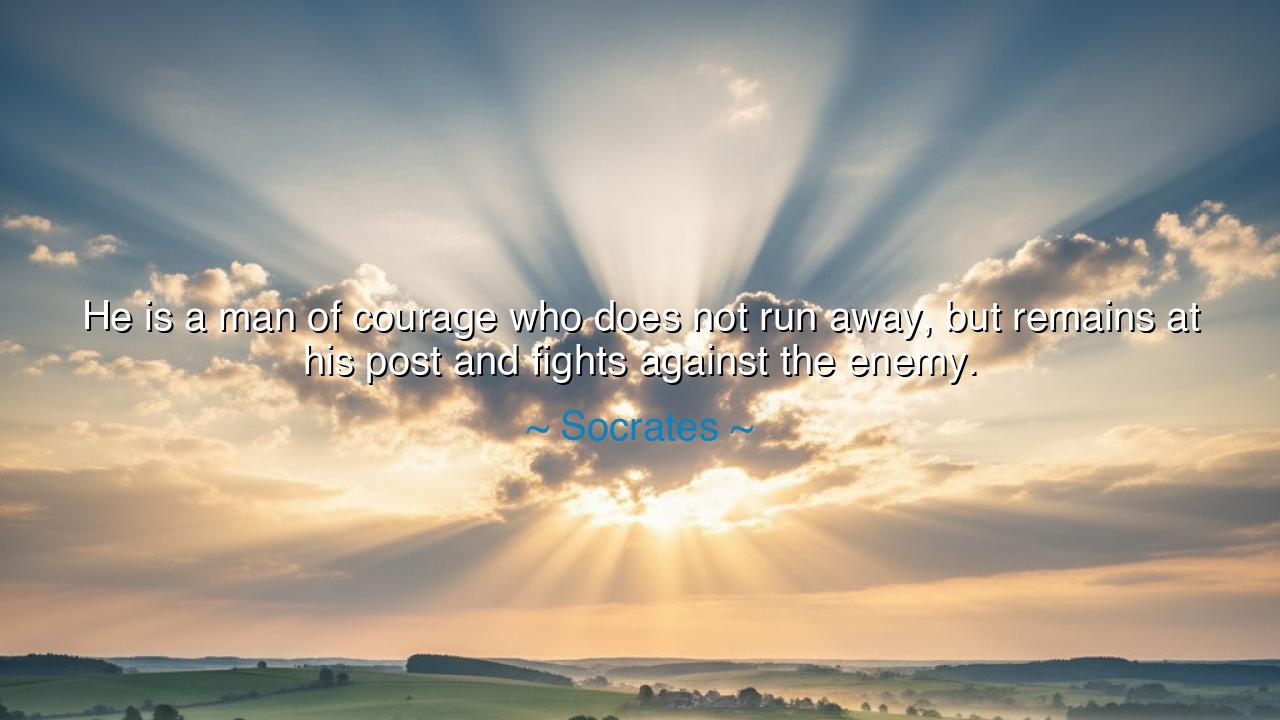
He is a man of courage who does not run away, but remains at his
He is a man of courage who does not run away, but remains at his post and fights against the enemy.






The philosopher Socrates, whose wisdom has outlived the fall of empires, once declared: “He is a man of courage who does not run away, but remains at his post and fights against the enemy.” In this sentence lies a truth that echoes through the centuries—a truth not only about war, but about life itself. For every human being, in some season, must face a battle. Some fight with swords, others with their conscience, their grief, or their doubt. The mark of the courageous man, Socrates teaches, is not that he never fears, but that he does not flee from duty when fear rises. He stands where he is needed most, and he does not abandon his post.
In the ancient world, Socrates was not only a philosopher but a soldier. He fought in the Peloponnesian War, enduring hardship and danger with calm dignity. His words, then, were not born from theory, but from the proving ground of experience. He knew that courage was not recklessness, nor blind aggression—it was endurance of the soul. The warrior who charges forward without thought is a fool, but the one who holds firm amidst terror, guided by reason and purpose, is truly brave. For courage, as Socrates taught, is the balance between cowardice and rashness—it is the harmony of heart and mind in the face of fear.
The origin of this quote arises from his reflections on virtue in The Laches, one of Plato’s dialogues. When asked to define courage, Socrates rejects the idea that it is mere endurance or physical bravery. Instead, he reveals it as moral steadfastness—the commitment to truth and duty even when the body trembles or the heart breaks. To “remain at one’s post” is not only the soldier’s task; it is the calling of every soul who seeks integrity. Whether in the battlefield of politics, of justice, or of conscience, the true courageous man is he who does not flee when his principles are tested.
History offers us countless mirrors to this wisdom. Consider the story of Leonidas, the Spartan king, who stood with his three hundred at Thermopylae. Outnumbered by the armies of Persia, he could have fled, preserving his life and his glory. But he did not. He remained at his post, holding the narrow pass not for victory, but for honor. His courage was not born of hope for survival, but of devotion to duty. Though he and his men perished, their stand awakened the spirit of Greece, proving that one moment of steadfastness can inspire generations. In that act, Leonidas became a living embodiment of Socrates’ teaching: that the man of courage does not measure success by triumph, but by fidelity to what is right.
Yet Socrates’ words speak not only to heroes of the battlefield, but to the quiet warriors of everyday life. The teacher who stands for truth against ignorance, the parent who endures hardship for the sake of their children, the reformer who faces scorn for justice’s sake—these too “remain at their post.” The enemy they fight may not wear armor, but the battle is no less real. It is the fight against despair, corruption, temptation, and indifference. In every era, the truly courageous are those who do not abandon their principles when the world grows dark. They stand firm, unmoved by fear or fatigue, for they know that retreat of the spirit is worse than defeat of the body.
Socrates himself lived—and died—by his own words. When Athens condemned him to death for his teachings, his friends urged him to flee. But he refused. “A man must do what is right,” he said, “not what is easy.” To run from death would be to betray his post as a philosopher, his calling as a seeker of truth. And so, he drank the hemlock calmly, leaving behind not only a legacy of thought but a living lesson in courage. His steadfastness at that final moment was the ultimate proof of his philosophy: that courage is not found in violence or survival, but in unwavering fidelity to one’s moral duty.
The lesson, then, is clear and eternal: courage is not the absence of fear, but the triumph of duty over fear. To remain at your post—to stay faithful to what is right when the world tempts you to flee—is the highest form of bravery. Each person, in their own life, has a post to guard: a truth to speak, a responsibility to uphold, a loved one to protect, a dream to pursue. Do not abandon it when storms arise. Do not let fear, doubt, or weariness drive you from your purpose. Stand where your heart tells you to stand, and you will find strength greater than fear itself.
So remember, O seeker of wisdom, the teaching of Socrates: the man of courage does not run away from his enemy, whether that enemy is outer or within. He remains steadfast, calm, and resolute, for he knows that victory belongs not to those who fight without fear, but to those who act rightly despite it. Therefore, guard your post—whatever it may be—with honor. Hold fast to your truth, even when the world trembles around you. For the soul that stands firm in the face of fear becomes unbreakable, and in that unbreakable spirit lies the truest definition of courage.






AAdministratorAdministrator
Welcome, honored guests. Please leave a comment, we will respond soon